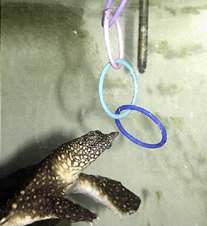IN most cases of hyperthyroidism the underlying thyroid lesions are described as benign adenomas or adenomatous hyperplasia, Professor Ian Ramsey from the Glasgow veterinary school told delegates at VetsNorth 2014.
Given the benign nature of such lesions, the prognosis for a cure should be good with effective therapy. However, many cases are medically managed for many months with anti-thyroid drugs in a non-curative fashion.
More recently an iodine-restricted diet has offered an alternative management for hyperthyroidism. If efficacious, this diet may revolutionise the treatment of hyperthyroidism. However, this diet is also not curative.
Moreover, there is growing concern that long-term medical (or even dietary therapy) may be associated with an increasing prevalence of thyroid carcinoma. In contrast, surgical thyroidectomy and thyroid ablation using radioactive iodine have been shown to be safe and effective methods with survival times measured in years.
Dietary management
The diet must be used as the sole food source for the affected cat. Even small quantities of other foods (including milk) are likely to make the diet ineffective. Equally, the diet must not be used as the sole food source for healthy cats. The diet must not be used at the same time as anti-thyroid medication or radio-iodine (hypothyroidism will likely result).
The diet does not treat the underlying tumour, which may get bigger and able to produce even more thyroid hormone. Ultimately it is likely that the tumour will “break through” and conventional medical, surgical or radio-iodine treatment will be needed.
However, for mildly affected animals that will eat the food and do not get access to anything else, this may be an effective treatment. It is particularly likely to be useful as a pre-surgical stabilisation. Monitoring of T4 concentrations is essential to judge the effect of therapy.
Medical management
Methimazole and carbimazole are the drugs most frequently used for pre-operative and long-term medical management of hyperthyroidism because of their consistent and potent effect in lowering thyroid hormone concentrations.
The recent launch of a sustained-release product containing carbimazole has questioned the need for multiple daily dosing. In addition, there are transdermal preparations available, making medical management possible in cats that cannot easily be given tablets.
Whilst anti-thyroid drugs may be used to control clinical signs prior to surgery or whilst awaiting radioactive iodine therapy, they remain a common option for long-term control.
Surgical management
Bilateral thyroidectomy is usually the cheapest long-term option and is nearly always effective (providing both thyroid glands are removed). Pre-surgical stabilisation with methimazole or carbimazole or a low iodine diet for at least two weeks before surgery reduces intra-operative complications.
However, there are still some risks associated with anaesthesia and surgery in an older animal. Post- operative complications may also occur. Hypoparathyroidism, which manifests as muscle tremors, tetany and generalised convulsions, is the most common. Hypothyroidism, Horner’s syndrome and laryngeal paralysis are less common.
Radioactive iodine
Radioactive iodine is often considered the gold standard treatment for hyperthyroidism. It has the fewest complications and the highest success rate. However, cats need to be hospitalised following its administration. Main contra-indication is the presence of concurrent disease that requires daily monitoring/treatment.
Cats cannot be handled once isolated and therefore cannot be medicated. Veterinary treatment centres continue to attempt to decrease hospitalisation periods with a potential impact on how owners handle their own animal thereafter.










